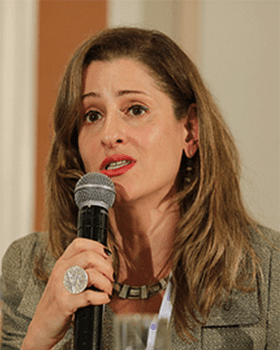Marwa Daoudy
Associate Professor of International Relation, School of Foreign Service, Georgetown University
Dr. Marwa Daoudy is an Associate Professor of International Relations at Georgetown University’s School of Foreign Service (SFS) and the Seif Ghobash Chair in Arab Studies at the Center for Contemporary Arab Studies (CCAS). Prior to Georgetown University, Dr. Daoudy was a lecturer at Oxford University (UK) in the department of Politics and International Relations, a fellow of Oxford’s Middle East Center at St Antony’s College and a visiting scholar at Princeton University’s Woodrow Wilson School of Public and International Affairs. In 2023-2024, she was awarded a Global Fellowship by the Wilson Center for International Scholars and was affiliated with the Environmental Change and Security Program (ECSP) and the Middle East Program (MEP).
Dr. Daoudy’s research and teaching focus on critical and human security studies, environmental and climate security, climate justice, water politics, negotiation theory, peace negotiations, and Middle East politics.
Dr. Daoudy’s second book on The Origins of the Syrian Conflict: Climate Change and Human Security (Cambridge University Press, 2020) won the 2020 Harold and Margaret Sprout Prize by the International Studies Association, awarded for the best books in the field of environmental studies. Her first book The Water Divide between Syria, Turkey and Iraq: Negotiation, Security and Power Asymmetry (CNRS Editions, 2005) received the Ernest Lémonon Prize by the Institute of France at the French Academy (Académie Française). Her third book titled Climate Justice in the Middle East and North Africa: Rethinking Security and Vulnerability is under contract with Cambridge University Press.
Amongst her recent academic articles and book chapters feature The Challenges of the Increasing Institutionalization of Climate Security (w/ J. Hardt et al.) (PLOS Climate, 2024), Forum: At the Crossroads – Critical perspectives on the Study of Climate Security (w/ Austin et al. 2024) (Geoforum, 2024), Ten New Insights in Climate Science (w/ M. Martin et al.). (Global Sustainability, 2022), Power Plus: Tony Allan’s Contributions to Understanding Transboundary Water Arrangements (w/ Zeitoun, Cascâo, Greco, Mirumashi and Warner) (Water International, 2022), Migration and the 2030 Agenda: Migration as a Path to a More Sustainable World (One Earth, 2022), Words, Water, and Waste: How Government Discourse Shapes Environmental Protest in Lebanon and Jordan (w/ J. Langlois) (POMEPS, 2022), What is Climate Change? Framing Risks around Water, Food and Migration in the Middle East and North Africa (w/ J. Sowers and E. Weinthal) (WIREs Water, 2022), Rethinking the Climate–Conflict Nexus: A Human–Environmental–Climate-Security Approach (Global Environmental Politics, 2021), Climate and Conflict: Lessons from the Syria Case (in The Oxford Handbook of Comparative Environmental Politics, 2021), Water Weaponization in the Syrian Conflict: Strategies of Domination and Cooperation (International Affairs, 2020),
She has also published in numerous policy outlets. Her recent policy publications include a comment piece on Water, Health and Peace: A Call for Interdisciplinary Research published in The Lancet; an edited book titled Troubled Waters in Conflict and a Changing Climate: Transboundary Basins Across the Middle East and North Africa (Carnegie Endowment for International Peace, 2024), which includes her chapter on “Institutionalizing Hegemony Through Peace Negotiations: Water in the Occupied Palestinian Territories.” She also wrote reports for the Council on Foreign Relations on Climate Change and Regional Instability in the Middle East (2023) and the Century Foundation titled ‘Syria’s Human Security is Inseparable from Its Environmental Health’ (The Century Foundation, 2020), an article for Foreign Affairs titled Scorched Earth: Climate and Conflict in the Middle East (2022), a paper on Northwestern Syria in the Time of Cholera, Earthquakes, and Environmental Degradation (w/ Dureid M. and Mayer-Rich E.) (Malcolm H. Kerr Carnegie Middle East center, 2023) and opinion pieces on ‘Gaza, Yemen, Syria, Human Rights, and Oil: The Elephants in the COP28 Room’ (Wilson Center, Environmental Change and Security program, New Security Beat Blog, 2023), The Collective Punishment of Palestinians in Gaza ( Wilson Center for International Scholars, Viewpoints, 2023), Egypt and COP27: Leading Abroad, Repressing at Home (Malcolm H. Kerr Carnegie Middle East Center, Diwan Insights, 2022), The Syrian Revolution: A Story of Politics, not Climate Change (the Royal United Services Institute, RUSI, 2022).
In a recent essay, she describes her visit to the land her forebears inhabited in Palestine for generations before they were driven into exile on the eve of Israel’s creation (New Lines Magazine, 2023).
Dr. Daoudy has featured in Al Jazeera documentary series, The New Humanitarian, The Hindu, Foreign Policy, Al Monitor, L ‘Orient Le Jour, Carnegie Strategic Europe Forum, the Wall Street Journal, Agence France Presse, Vice Arabia, BBC World Service and NewsNight, Jazeera, France 24 and other news media. She has also contributed to a series of podcasts, such as Syria Alternatives, Duck of Minerva, The Fire These Times, Centre Arabe de Recherches et Etudes Politiques (CAREP), CSIS Babel, Chatham House UnderCurrents, SEPADPod and others.
She is a member of the Academic Advisory Board at the Arab Center Washington DC. She was previously a non-resident scholar with the Malcolm H. Kerr Carnegie Middle East Center (Beirut, Lebanon) where she led the climate change, conflict and governance project. She has collaborated with the UNESCO-World Water Assessment Program (WWAP), the UN-ESCWA (UN Social and Economic Commission for Western Asia, Beirut) and advised the United Nations Development Program (UNDP, Jerusalem) on Palestinian water rights in the Israel-Palestine peace and water negotiations.

